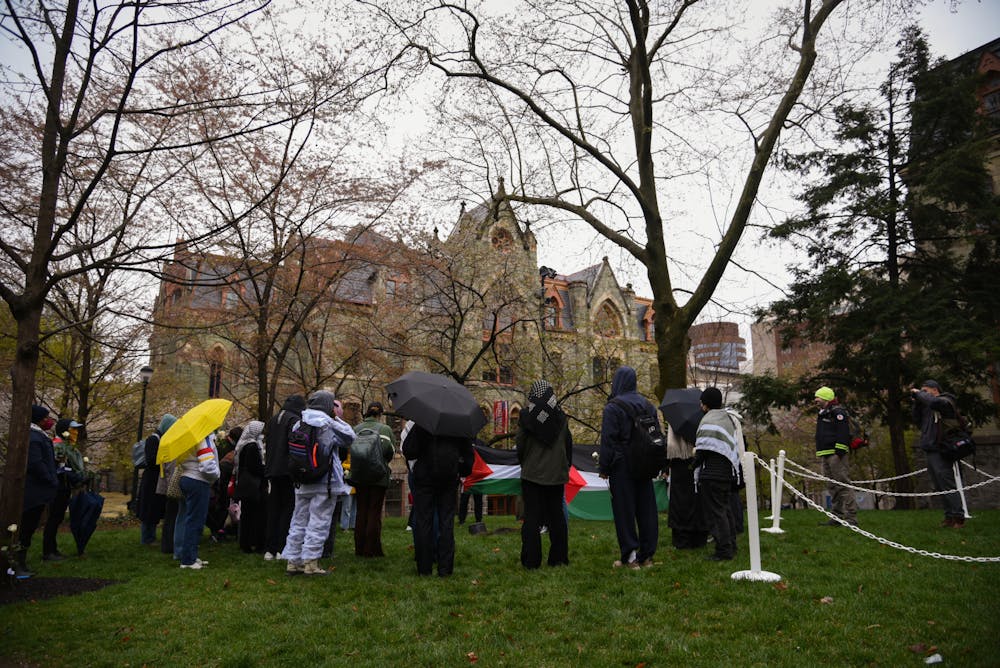
Around 40 Penn community members gathered for an interfaith vigil honoring “the martyrs of the Palestinian genocide” on Friday.
The April 11 vigil began around 10 a.m. on Locust Walk and took place after “over five hundred days of unimaginable genocide in Gaza,” according to a statement from pro-Palestinian organizers announcing the event. Groups including Penn Faculty, Staff & GradWorkers for Justice in Palestine, Philly Socialists, and the Philly Palestine Coalition co-hosted the event.
“We are witnessing a genocide in real time. There are no words to describe the depth of our continued heartbreak,” the statement read. “We have a duty to honor our martyrs.”
Numerous human rights organizations and experts — including Amnesty International, Human Rights Watch, and the United Nations — have labeled Israel’s actions in Gaza a genocide of the Palestinian people.
The programming included several moments of silence, songs, and speeches from organizers. In one speech, an organizer underscored the right to mourn Palestinian lives that have been “silenced, brutalized, and disrespected.”
“It is our right to make faith when a soul has departed from this Earth,” the organizer continued. “It’s a human right to be laid in peace, to have your body respected as the soul leaves it.”
They also expressed their “hat[red]” for having to “call everyone here brave.”
“I shouldn’t have to tell you [that] you are brave for coming here to mourn,” the organizer said.
Two pastors of the Germantown Mennonite Church also spoke in “solidarity” with the organizers of the vigil. The pastors described the Church’s upcoming “Holy Week” and what mourning means for “folks from the Christian tradition.”
“Our streets exalt God,” one pastor said. “They pray for the mosques and the houses every time the bombing begins.”
The vigil was originally scheduled to take place by the LOVE statue but was moved to Locust Walk after Penn put barricades around the statue the day before the event.
“In preparation for our Vigil tomorrow, Penn has already started barricading college green,” PAO wrote in an Instagram story before the event. “LET US MOURN.”
A request for comment was left with a University spokesperson.
Shortly after, the event relocated to the lawn outside Claudia Cohen Hall after Penn administrators requested that the demonstrators move, citing the University’s Temporary Standards and Procedures for Campus Events and Demonstrations. The vigil participants then began their programming, which included a “security briefing” that recommended behavior for the event.
“We want to create a space for mourning, to honor the Palestinian martyrs murdered by the Zionist enemy,” one organizer said. “However, mourning Palestinian lives at Penn is nothing short of the most political act we can engage in, meaning that we will experience the Penn administration as well as police attempt[ing] to stop us from honoring the event.”
The organizer emphasized that “we have your safety in mind” and noted that “if we decide to move locations because of disruption to our ability to properly mourn, that means that we stay together, move together, and don’t leave anyone behind.”
Organizers advised the participants not to “engage or speak to the police or Penn administration” and encouraged attendees to “ignore” individuals who tried to “disrupt the event.”
The safety briefing procedures mirrored the reminders listed on the initial event announcement post, which advised participants to “cover up with more than a face mask” and “leave your Penn ID at home.”
As the scheduled event began, Senior Associate Vice Provost for Student Affairs Tamara Greenfield King and Office of Student Affairs Executive Director Katie Bonner — who both serve as Vice Provost for University Life open expression delegates — told organizers that they did not have a reservation for the event area and that moving to 34th and Walnut streets would be “satisfactory” if they wished to continue the vigil.
Bonner referred to Penn’s temporary open expression guidelines, which were announced in June 2024. According to the guidelines, nonacademic events in several areas of campus — including Locust Walk — require organizers to apply for approval from Penn University Life two weeks in advance.
King and Bonner also distributed flyers to attendees at the vigil with a QR code linking to the guidelines and text that read, “failure to discontinue this behavior may result in disciplinary action.”
In addition to members of the administration, multiple agents of Penn’s Division of Public Safety were present at the vigil. At least one DPS officer, along with King, took pictures of participants at the event.
The Daily Pennsylvanian is an independent, student-run newspaper. Please consider making a donation to support the coverage that shapes the University. Your generosity ensures a future of strong journalism at Penn.
Donate







